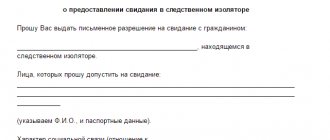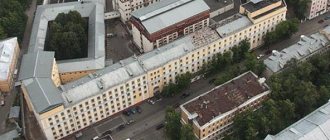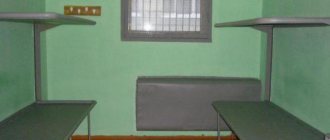The main difference between long-term and short-term dates is the duration, of course. The first last 4 hours, the second – up to several days. By the way, there are no long-term detention centers, only short-term ones.
This article will focus specifically on short-term visits and specifically in correctional colonies, and not in pre-trial detention centers. The main difference between them is that for short-term stays in a pre-trial detention center you need to obtain permission. They are regulated by Article 89 of the Penal Code of the Russian Federation “Visits of persons sentenced to imprisonment”, as well as paragraphs 69-83 of Order of the Ministry of Justice of the Russian Federation of December 16, 2016 No. 295 “On approval of the internal regulations of correctional institutions.”
Duration of the date
A short-term visit to the IC cannot exceed four hours. This period of time can be reduced at the request of the prisoner himself or his visitors. To do this, they just need to tell the warden about their desire to interrupt the meeting. The remaining time will not be saved and the convicted person and his relatives will not be able to use it additionally during the next meeting.
Employees of the colony administration can also interrupt a meeting, but only if the rules of its conduct are violated by the convict and his visitors.
Who can come for a short date?
The law does not limit the right to visit prisoners only to their relatives. Friends and acquaintances of the prisoner can come on a date. It does not matter what regime the convicted person is serving his sentence under. There are no restrictions on the degree of relationship for visitors, even for prisoners in high-security prisons.
The only limitation concerns the number of guests. No more than two adult visitors may participate in a short-term visit in prison at a time. Children or grandchildren can come with them, but their number must be agreed with the prison administration (according to paragraph 70 of Order No. 295 of the Ministry of Justice of the Russian Federation).
How does a long meeting with a convicted person go?
A long meeting takes place in separate rooms of the colony or in a hotel, which is located for these purposes on its territory. It costs money, we have previously talked about the approximate cost of a three-day date.
On a long date, you can cook in the kitchen . Kitchens are laid out differently in different prisons. In some places, each meeting room has a separate kitchen, in others there is one kitchen for several rooms. So sometimes you have to wait in line.
There is an opportunity to go outside, watch TV and DVDs with films. For three days there is no regime for convicts; they do not have to get up early and go to formation. It's a little vacation for them.
Visiting rooms are generally dirty . Therefore, it is better to take something with you to clean tables or dishes, take clean bed linen.
There are always unpleasant odors in the room, because rooms such as the toilet, smoking room and kitchen may be located close to each other.
Every meeting for a convicted person is a holiday, and its end is a terrible tragedy. Parting with loved ones is always accompanied by tears.
Visits in prison have strict restrictions. The convicts were recognized by the court as dangerous to society and requiring isolation.
Control over their lives does not stop even when they go on short or long-term visits with relatives.
Date with a lawyer
The law allows meetings of a defendant or convicted person with his lawyer and other legal representatives. Although in this case we are also talking about short-term dates, they are not subject to a 4-hour time limit.
The number of meetings with a lawyer is also unlimited. The prisoner has the right to conduct them at any time when the visiting room is free.
Article 89 of the Penal Code of the Russian Federation defines the right of a convicted person and his defense attorney to talk without listening to them and outside the hearing range of third parties.
How many dates are allowed?
The number of short-term visits, as opposed to their duration, directly depends on the prisoner’s detention regime. The more serious the crime committed, and therefore the regime of detention of the perpetrator, the fewer visits he can receive during the year.
In this case, the behavior of the prisoner himself plays an important role. For those who fulfill the requirements of the administration of the penal colony, as an incentive, the number of visits can be increased within the limits established by law. For violators, the number of visits will be reduced as a disciplinary sanction.
Order of the Ministry of Justice of the Russian Federation No. 295 clearly prohibits dividing the time of one date into several or, conversely, combining several dates into one to increase its duration.
Currently, the following restrictions on the number of short-term visits apply:
- For the general regime: in normal and light conditions - 6 dates per year, in strict conditions - 3 dates.
- For a strict regime: 3 dates under normal conditions, 4 under light conditions and 2 under strict conditions.
- For a special regime: in normal and strict conditions - 2 visits, in light conditions - 3.
These restrictions are regulated by Articles 121, 123 and 125 of the Penal Code of the Russian Federation.
For prisoners serving their sentences in a colony-settlement, there are no restrictions on short-term visits at all (according to Article 129 of the Penal Code of the Russian Federation).
Article 89 of the Penal Code of the Russian Federation allows prisoners to exchange a long-term visit for several short-term ones. But reverse exchange is prohibited.
The law also requires that dates be distributed evenly throughout the year. For example, if a convicted person is entitled to 4 visits per year, then the intervals between them should be 3 months.
The only reason for an unscheduled visit is a serious illness of the convicted person, threatening his life. In this case, relatives can visit him outside of the visiting schedule. This meeting will not be counted towards the total number of short-term dates.
Are transfers allowed for short-term visits?
Paragraph 79 of Order No. 295 of the Ministry of Justice prohibits bringing and transferring things or food during short-term visits in prison. This is only permitted during long visits with the prisoner.
However, in parallel with visiting the prisoner, you can give him food and things in the permitted quantity. To do this, you need to go through a special inspection procedure for brought items. The weight limit for such a gear is 20 kg. The amount per year depends on the mode of serving the sentence. For colony settlements there is no limit on the number of transfers. For general security prisons - from 3 to 12, depending on the conditions of detention (light, ordinary or strict), for strict security - 2-6, for special - 1-4 transfers per year.
The exception is female prisoners. For them, the number of transfers is not limited, but they must be evenly distributed throughout the year.
Medicines may only be given to the prison doctor if there is an appropriate prescription. The prisoner will receive them from the doctor daily in quantities determined by the prescription.
If you purchase goods at a prison kiosk, the inspection procedure is significantly reduced and simplified. Such goods are not unpacked, but are immediately handed over to the convicted person.
For attempting to transfer prohibited items, the perpetrator may be prosecuted under Article 19.12 of the Code of Administrative Offenses of the Russian Federation.
What can you take with you to the zone?
What can you take with you on a long visit to prison? Food, non-alcoholic drinks, books, videos, hygiene items, and wearable items are allowed - light or warm, depending on your relative's needs. Alcohol-containing products, drugs, and cell phones are not allowed
Even if you have heard about bribes as a method of transfer, it is better not to use them if you do not want to end up in the dock yourself.
List of approved products
List of foods allowed during visits in prison:
- "bum packages" such as instant noodles;
- bouillon cubes;
- black loose leaf tea;
- porridges that only require dilution with boiling water to cook;
- vegetable oil;
- melted butter or chicken fat;
- bread;
- cheeses;
- honey in plastic containers;
- sugar;
- cigarettes;
- candies such as caramels;
- condensed milk.
What can you take with you to a meeting with a prisoner?
There is an approved list of prohibited items for bringing into the territory of correctional institutions. It includes:
- Drugs, alcohol and tobacco.
- Communication equipment and laptops.
- Money and jewelry.
- Weapon.
Everything that is not included in this list can theoretically be taken with you. But in practice, since the guest and the prisoner on a short-term visit should not have physical contact, bringing any things is pointless. They are more likely to alert the guards, who will suspect the visitor’s desire to illegally transfer them to the prisoner. Therefore, it is better to leave personal belongings at the checkpoint against the signature of the colony officer.
It is understandable to want to take printed photographs with you to a meeting. This is not prohibited, but you should first notify the colony officer about their presence and show him these photographs.
All about long dates
Like everything in correctional institutions, long-term visits are strictly regulated not only by the number of visits themselves, but also by the location of them, the number of visitors, their composition, food and things that visitors can have with them, etc.
We talked about the rules for holding and providing long-term visits with convicts in MLS here.
Administrative procedure
In order to obtain permission to visit, the convicted person or the person arriving to visit him must obtain permission from either the head of the correctional institution or his substitute representative of the administration. If a request for a visit is refused, the written statement must contain a record of the reasons.
The person arriving on the date must have documents proving his identity in the form of:
- passports;
- military ID;
- birth certificates;
- marriage certificates;
- documents of guardianship and trusteeship authorities;
- ID cards.
At the same time, persons who are documented as:
- spouse;
- parents;
- children;
- adoptive parents;
- adopted;
- siblings;
- grandparents.
Also, in cases where, in the opinion of the administration of the correctional institution, the meeting will not negatively affect the convicted person, he may be allowed a meeting with persons not included in this list .
Most often this concerns common-law wives and husbands who cannot officially be included in the list of relatives. Here everything is decided by the head of the colony. And his decision may be influenced by the previous behavior of the convict in the colony and the reputation earned there. In addition, his decision may be influenced by the sincerity of the application addressed to him from his common-law wife or husband, as well as, to a greater extent, a certificate from the housing and communal services department about the couple’s cohabitation in a specific living space.
Searching relatives and checking the availability of documents confirming their health
Citizens arriving on a date, their belongings and clothes will be subject to mandatory inspection. If the arrival does not want to undergo this procedure, this may serve as a refusal to hold a meeting. In the event that during the inspection, unauthorized items are found on arrivals, they are handed over to the inspector for safekeeping against receipt until the end of the visit.
In addition, both close and distant relatives, and other persons allowed to visit, are required to undergo a medical examination and have documents confirming this. Their set in each PS is established independently, but most often certificates are required:
- about a blood test for HIV;
- about a blood test for RW (syphilis);
- about a blood test for hepatitis C;
- about fluorography;
- with a gynecologist's report;
- with a venereological report;
- with a therapeutic conclusion.
It is clear that this is being done in order to preserve the health of convicts and prevent epidemiological danger for the entire correctional institution.
Where do long dates take place?
Visits are carried out within the correctional institution in specially designated premises. Many correctional institutions have specialized hotels in which relatives live at their own expense or at the expense of the convicted person.
There are kitchens where you can prepare food from the products you brought with you. Sometimes such kitchens are attached to each meeting room, and sometimes they are shared, so you have to wait in line. Often, date participants have the opportunity to go out into the fresh air within the hotel complex, watch TV or video discs.
Additional paid services
The convicted person can select the necessary equipment and devices in advance from the list that is provided to him before the visit and pay for them. As a rule, their cost is within 50 rubles each. Typically, the average cost of the selected items does not exceed 500 rubles.
For 3 days, the convicted person is not required to comply with the regime established in this correctional institution, that is, he receives a kind of short-term leave. But this does not mean that he is free to do whatever he pleases. For security purposes, telephones are installed in each room by which you can contact security.
Procedure for long visits
There is a procedure for holding long dates. Relatives are the first to enter the premises intended for this purpose, and only then the convicted person. Those present leave the premises in the reverse order.
At the same time, during a long visit, relatives can leave the territory of the correctional institution only with the permission of its administration, and upon return they must undergo a new search along with their belongings and food.
Exemption from work
During long visits, convicts are usually released from compulsory labor. However, this must be preceded by preliminary training, which can also be carried out after the end of a long visit.
How many visitors are allowed?
On a long-term date, as well as on a short-term one, no more than 2 adults can be present at the same time. However, minor brothers and sisters, children and grandchildren of the convicted person are allowed to come with them. The relationship of visitors is determined by paragraphs 4 and 37 of Article 5 of the Code of Criminal Procedure of the Russian Federation.
From our separate publications you will learn how sentences are served in:
- women's prisons;
- educational colonies;
- settlement colonies;
- general regime institutions.
List of products and things you can take
There are clearly regulated items and products that are allowed or prohibited for relatives or persons allowed by the administration to have a long visit with the convicted person. You can come to a prisoner with:
- food products;
- soft drinks, unless they are in glass containers;
- books, discs with videos;
- personal hygiene items;
- bed linen;
- clothes for him and for visitors.
The list of permitted food products consists of:
- instant mixtures in packages such as noodles, broths, soups and other similar products;
- tea and coffee;
- small quantities of canned food;
- honey, sugar, condensed milk in soft packaging;
- additives for flavoring food in the form of bouillon cubes, seasonings, vegetable oil, onions and garlic;
- products of animal origin, but necessarily non-perishable;
- dried fruits;
- bread, but not more than one loaf.
In this case, it is strictly forbidden to come on a date with:
- narcotic substances;
- alcoholic drinks;
- mobile phones, smartphones and tablets;
- chargers;
- SIM cards;
- money;
- weapons and means of their production.
How are the meetings going?
The procedure for short-term visits is determined by the internal regulations of a particular correctional institution. Each IC has a special room for this.
All prisoners and their guests undergo inspection before and after their visit. By the way, the law gives the right to refuse such an inspection. In this case, a short-term meeting cannot be prohibited, but a long-term meeting if a search is waived will not be allowed quite legally.
The prisoner is required to show up for a meeting in a neat manner.
List of persons who are allowed visits
Visits with a convicted person in a pre-trial detention center are allowed to a limited number of persons:
- lawyer;
- close relatives, no more than two at a time. It is worth noting that minor relatives are also allowed to visit, provided they are included in the official permission to visit from an authorized official;
- a notary, if necessary, to prepare any documents.
According to the internal regulations of pre-trial detention centers and correctional institutions, the following persons are not allowed to visit:
- under the influence of alcohol or drugs;
- not having an identification document with them;
- not specified in the official permission to visit.
Meeting room
All rooms for short-term visits are arranged in such a way as to exclude the possibility of physical contact between prisoners and their visitors. There is usually a long table in the room, with or without partitions. But in any case, prisoners and visitors are separated by bars or glass. You can talk through a partition, a special window or a telephone handset (depending on the characteristics of a particular room in a given IR).
There are completely isolated visiting rooms, in which the prisoner and his guest are separated from other couples meeting. But in any case, the meeting is closely monitored by colony staff, who can also listen to conversations between the convict and his visitor.
Have a question for a lawyer? Ask now, call and get a free consultation from leading lawyers in your city. We will answer your questions quickly and try to help with your specific case.
Telephone in Moscow and the Moscow region: +7
Phone in St. Petersburg and Leningrad region: +7
Free hotline throughout Russia: 8 (800) 301-39-20
Order of appointment
To meet with family or friends, the prisoner must take the following actions:
- Write an application for a short-term visit in advance. Permission for this must be given by the head of the colony.
- If you want to transfer food or things to a prisoner, you should do this before goodbye, especially since in the penal colony there are usually long queues at the parcel delivery points.
- Expect an invitation to a date. The waiting period can reach several hours.
- Go through security check. Usually, before a short-term visit, colony staff probe clothing in search of prohibited items.
- The meeting itself lasts 4 hours in a special room under security supervision.
- Repeated search of the prisoner and visitors after the end of the visit.
The procedure seems simple, but in practice it involves waiting for many hours. The fact is that in most prisons there are very long queues of people wanting to meet their relatives. As a result, an application for a visit may only be approved the next day, which makes it difficult for out-of-town guests to visit the convicted person.
Experienced visitors come to queue a few hours before the IC administration starts work.
Security surveillance
Throughout the short-term visit, a correctional officer will be present in the room to ensure that the participants in the meeting comply with the rules of conduct. If they are violated, he has the right to interrupt the meeting.
In addition, the conversation is listened to and recorded on video. This is explained by measures to protect against the preparation of shoots. Technical equipment for wiretapping and video recording was installed in accordance with Order of the Ministry of Justice No. 279.
In this regard, you should not give the prisoner any secret information on a date. It is better to do this through his lawyer, since their meetings take place without control from the administration of the penal colony.
Visit in pre-trial detention center before trial
Until a citizen is found guilty, he awaits a court decision in a pre-trial detention center. Visits in this institution are allowed only with relatives, a lawyer, and a notary. In accordance with paragraph 139 of the internal regulations of the pre-trial detention center, meetings can only be short-term and no more than 2 times a month.
note
Prison in Russia differs in the conditions of detention of convicts - general, special and strict regime. Those, in turn, are divided into light, normal and strict conditions of detention. You can compare the difference in this article
Permission to visit a pre-trial detention center can be given by the following officials:
- investigator, if investigative actions have not yet been completed;
- a judge, if the investigation is completed and the case is transferred to court (clause 18 of Federal Law No. 103-FZ of July 1, 1995);
- the head of the pre-trial detention center when the court has already passed a sentence;
- the appeal board, if the case is referred for appeal (by the way, you can read about the time frame for considering an appeal here)
After receiving permission, the citizen who requested a visit must appear at the pre-trial detention center with permission and his passport. It is worth noting that pre-trial detention center employees have the right to inspect a person who comes to a meeting with a prisoner.
Directly at the pre-trial detention center, visits are granted on a first-come, first-served basis. You can sign up for this queue via the Internet through the electronic queue website, or during a personal visit to the pre-trial detention center through the terminal. If this institution does not have such technical equipment, then in this case you need to take a place in the live queue.
Grounds for interrupting a meeting
Each visitor is introduced to the conditions of the meeting. If they are violated, the date will be interrupted. The following are considered violations:
- Attempts to give or receive anything from a prisoner.
- Aggressive behavior of a guest or prisoner.
- An attempt to convey information using signs or text on a piece of paper.
- There is a threat to the life of the visitor.
A request to interrupt a meeting by any of its participants will also be grounds for its termination.
Please note that communication in a foreign language is prohibited without the participation of an interpreter.
If visits negatively affect the prisoner’s behavior, the administration has the right to prohibit meetings with these persons.
Features of dates in specific punishment regimes
All modes are united by the following requirements for short-term dates:
- The prisoner has the right to request that visits be replaced by telephone conversations.
- The visitor must arrive for the date sober.
- While the prisoner is in the punishment cell, he will not get a meeting.
- Medical quarantine in the penal colony is the basis for a temporary ban on all visits.
In addition to these requirements, each detention regime has its own specific restrictions on visits.
Colony settlement
In such places, persons who have committed crimes of minor and medium gravity, as well as those who committed them unintentionally, serve their sentences. They can move freely within the settlement, and with the permission of the administration, also leave its territory.
There are no restrictions on the number of visits, and upon application you can even obtain the right to a visit outside the penal colony.
General regime colonies
There are the most such correctional institutions in Russia. People end up here for various crimes. Reward and punishment measures are provided for prisoners, depending on their behavior.
If the prisoner complies with the rules of conduct in the penal colony, as an incentive he can receive 2 additional short-term visits per year with his children. Usually such meetings are timed to coincide with holidays.
In easier conditions, the number of such meetings with children on holidays is not limited at all. But this privilege is most often given to imprisoned single mothers.
Maximum security colony
Such correctional institutions contain only men who have committed serious crimes. Women for similar violations of the law are sent to serve their sentences in a general regime penal colony or in women's prisons.
A prisoner must serve at least 9 months in a strict regime with general conditions before he can be transferred to light conditions. Only in this case can he apply for an additional short-term date.
date in prison
Special regime colony
In such places of deprivation of liberty, it is extremely difficult to receive any incentives, especially in the form of additional meetings with loved ones. This is due to the fact that, as a rule, persons who have committed particularly serious crimes - mass murders, rapes, terrorist attacks - are subject to special treatment.
Kinds
The first are provided for four hours, the second - for three days with accommodation in a special room (for example, in a hotel with relatives at the expense of the convicted person or his relatives) or for five days outside the zone.
How long you will be allowed to communicate will depend on a number of factors : the type of punishment, the conditions of detention, and the decision of the management of the correctional institution (Articles 123, 121, 125, 131, 89 of the Penal Code of the Russian Federation).
For example, your brother was sentenced to serve his sentence in a general regime correctional colony and is being kept in light conditions. He is entitled to six long-term visits in a general regime colony, and the same number of short-term visits per year. If the conditions are normal, then there will be four long ones. In strict ones - two of these, two others.
Let's say we have a high security zone. Under normal conditions, there are three long visits in a maximum security colony and three short ones, in strict conditions - two short-term visits, and only one long visit per year. In the facilitated ones - four times of each type of date.
The nuts are tightened even tighter in a special mode . There, under normal conditions, two short and long visits are allowed, and under easier conditions, one more. In strict ones, only short-term ones are allowed, and then only two per year.
Of course, the most attractive conditions in a settlement colony are that visits there are not limited. Moreover, there you can communicate with your family even outside the institution.
To obtain permission to visit, you need to write an application addressed to the head of the colony, or the one who replaces him.
A person who has been sentenced to “general regime” may remain in the same pre-trial detention center where he was awaiting trial - in the economic services detachment. In addition to guaranteed parole, subject to hard work, such prisoners are also allowed long visits. And short-term meetings will no longer last two hours, but four.
Short term
Provided in a special room with the prisoner’s relatives or other persons - in agreement with the head of the colony.
A representative of the colony will definitely be present - this must be treated with understanding, all conversations will be vigilantly listened to by him.
No products or things can be transferred during short visits . There are programs for this.
Long-term
What is a long visit in prison? It takes place on the premises of the colony or outside it in a hotel-type building at the expense of the relatives of the convicted person. You can bring food and drinks with you, but not in glass containers. You cannot go beyond the designated area. Or rather, it is possible, but this will mean the end of the date.
There is another problem - long meetings are allowed only to family people or supply managers of detachments - however, the latter are generally given all sorts of concessions. In the case of a close relationship - spouse, parents, child (natural or adopted), brother, sister, grandmother, grandfather - the meeting will be allowed without problems, not contradicting the regime and conditions of detention, of course.
It is no coincidence that a mandatory point in an application for a visit is to indicate the degree of relationship with the convicted person. The rest - including the prisoners' cohabitants - may well hear a refusal.
How to write an application for a short-term date?
You can get a visit only after submitting a special application addressed to the head of the correctional institution.
When approving the application, the boss will sign and seal it.
The text of the application must indicate:
- Name of the correctional institution.
- Name and position of his boss.
- Full name and address of the applicant.
This information is indicated in the header of the application. It is followed by a title, followed by a pleading part. It must indicate:
- Full name of the convicted person and his date of birth.
- Exact data on his location (number of IR, detachment, etc.).
- Type of date.
- List of visitors and their passport details. The presence of a minor at the date is specified separately.
- Ask for a meeting.
Additionally, you can indicate the degree of relationship between the visitor and the prisoner, but this information is not required to obtain a short-term visit.
At the end of the application you must put a date and signature.
How to get permission to date
The procedure for granting visits to convicts in a penal colony involves the issuance of permission by the head of the institution (or his deputy) upon a written application from either the prisoner himself or those wishing to see him.
Before writing an application for a meeting with a convicted person, you must prepare documents confirming your identity and relationship. You need to take them with you - passport, military ID, marriage certificate, etc. Persons who do not have one of the listed documents with them will not be allowed to see the convicted person.
The application is drawn up in free form:
To the Head of the Federal Penitentiary Service of Russia for the Kemerovo Region, IK No. 6, Colonel of the Internal Service, A.V. Karpov.
From Antonina Nikolaevna Repenina, living at Kemerovo, st. Gorodskaya, 8, apt. 9 Passport series 1219 No. 2929292, issued on October 21, 2010 by the Leninsky District Department of Internal Affairs of the Kemerovo Region
APPLICATION for a long-term (short-term) meeting with a convicted person (sample)
I ask you to grant a long (or short-term) meeting with my son Maxim Georgievich Repenin, born in 1987, detachment No. 4.
I am familiar with the rules for long-term (short-term) visits, fire safety rules, and the list of prohibited items.
Warned about administrative and criminal liability for non-compliance with the rules of the meeting.
11/20/2018 Repenina A.N., signature
Usually the applicant is asked to fill out a ready-made form that needs to be completed. In some cases, such forms may further explain specific articles of criminal and administrative laws - for example, liability for illegal carrying of weapons under Art. 222 of the Criminal Code of the Russian Federation, as well as administrative liability under Art. 19.12 of the Criminal Code of the Russian Federation. The form contains a column where you need to put your signature warning of possible liability.
If an application for a long visit is being drawn up, you must indicate the time period during which it will take place. For example - for 2 days. If the person wishing to attend a long-term meeting is not a close relative of the sentenced person, the application must provide the reasons why permission is needed. For example, a partner who has a child together with a prisoner plans to come for a long date. Then the birth certificate, in which the cohabitant is recorded as the father, will be the basis for recognizing the case as exceptional and, most likely, permission will be given.
We have already written that a convicted person can consult with a lawyer who has a warrant without hindrance for up to 4 hours a day. In order for the meeting to take place, the lawyer or prisoner must write a statement:
To the Head of the Federal Penitentiary Service of Russia for the Kemerovo Region, IK No. 6, Colonel of the Internal Service, A.V. Karpov.
From Evgeniy Sergeevich Markin, detachment No. 1
STATEMENT
I ask you to provide a meeting with lawyer R.R. Stepanov. lasting 4 hours, in private, out of earshot of third parties and without the use of technical means of listening. An agreement has been concluded with this lawyer.
11/20/2018 Markin E.S., signature
Like any other, such an application is submitted to the administration of the institution, and written notification of the decision must be received. In certain situations, it is possible to draw up a schedule of meetings with a lawyer and immediately indicate several planned dates for consultations in the application. Usually such a statement is written by the lawyer himself, taking into account his employment in other cases.
Consideration of the application may take up to 3 days , but usually requests are answered immediately, understanding that many visitors are visitors.
It is important that when considering an application, the head of the colony can take into account data on the negative impact on the convicted person. This may be grounds for refusing to satisfy the application, even if the application was prepared by a loved one. For example, if a person sentenced to imprisonment for drug distribution has taken the path of reform, started working, and leading a healthy lifestyle, the head of the correctional facility may refuse a request for a visit from a person who is being held accountable for similar crimes.
Refusal of permission may be appealed in court. In judicial practice, there are cases when such refusals were recognized by the court as not complying with the law, then the head of the colony was obliged to provide the convicted person with the opportunity to see each other. An unconditional violation of the Penal Code of the Russian Federation is a refusal due to a recent visit to a pre-trial detention center , before the stage: the law emphasizes that the right to a first meeting for a convicted person arriving in a colony is granted regardless of how often the accused’s relatives came to see the accused in the pre-trial detention center. Almost always, the colony administration's failure to respond to an application is considered unlawful inaction.
Electronic application submission
Today, in addition to personally submitting an application for a visit, this can be done through the website of the Federal Penitentiary Service of the region in which the penal colony is located. To do this, you need to visit the section “For relatives of the convicted person.”
However, it is worth considering that not all colonies yet work with such forms of feedback from applicants. But there is another option - sending an application by email. In this case, the content of the application is no different from that for a personal visit to the colony, but the applicant’s contact information must also indicate an email address for a response.











